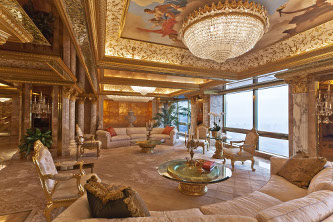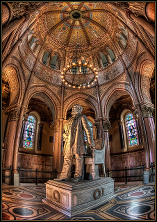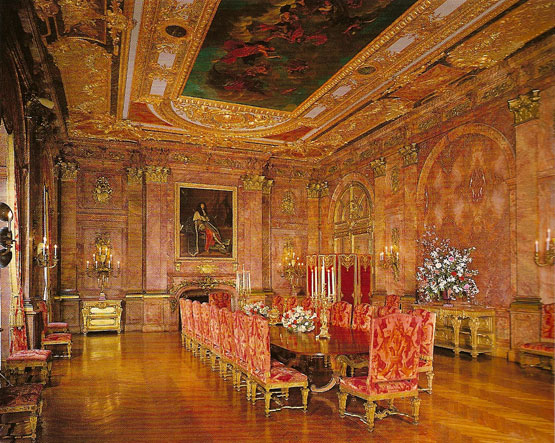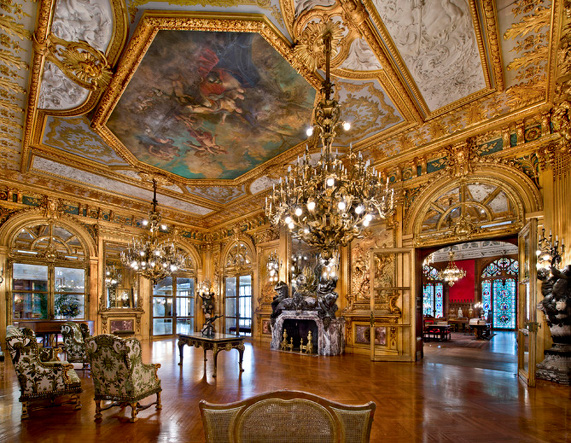Elaborate interiors and plain language
« previous post | next post »
In "The shape of things to come" (5/13/2016) and "Trump the Thing Explainer" (3/16/2016), I wondered why Donald Trump's spartan linguistic style is so different in character from his taste in interior design, which seems to be firmly placed in the tradition of elaborate artificiality that flows from 18th-century Roccoco and 19th-century Beaux Arts to the fantastic excesses of America's last Gilded Age:
| Donald Trump's New York apartment | James Garfield's tomb |
 |
 |
| The Vanderbilts' Marble House in Newport RI | |
 |
 |
The style of formal rhetoric in the Gilded Age was not as syntactically elaborate as 18th-century writing was, but the selection and arrangement of words within individual clauses was far removed from the norms of plain language. Can you imagine this passage from James Garfield's 1881 Inaugural Address being delivered by Donald Trump?
It has been said that unsettled questions have no pity for the repose of nations. It should be said with the utmost emphasis that this question of the suffrage will never give repose or safety to the States or to the nation until each, within its own jurisdiction, makes and keeps the ballot free and pure by the strong sanctions of the law.
But the danger which arises from ignorance in the voter can not be denied. It covers a field far wider than that of negro suffrage and the present condition of the race. It is a danger that lurks and hides in the sources and fountains of power in every state. We have no standard by which to measure the disaster that may be brought upon us by ignorance and vice in the citizens when joined to corruption and fraud in the suffrage.
The voters of the Union, who make and unmake constitutions, and upon whose will hang the destinies of our governments, can transmit their supreme authority to no successors save the coming generation of voters, who are the sole heirs of sovereign power. If that generation comes to its inheritance blinded by ignorance and corrupted by vice, the fall of the Republic will be certain and remediless.
The census has already sounded the alarm in the appalling figures which mark how dangerously high the tide of illiteracy has risen among our voters and their children.
To the South this question is of supreme importance. But the responsibility for the existence of slavery did not rest upon the South alone. The nation itself is responsible for the extension of the suffrage, and is under special obligations to aid in removing the illiteracy which it has added to the voting population. For the North and South alike there is but one remedy. All the constitutional power of the nation and of the States and all the volunteer forces of the people should be surrendered to meet this danger by the savory influence of universal education.
It is the high privilege and sacred duty of those now living to educate their successors and fit them, by intelligence and virtue, for the inheritance which awaits them.
In this beneficent work sections and races should be forgotten and partisanship should be unknown. Let our people find a new meaning in the divine oracle which declares that "a little child shall lead them," for our own little children will soon control the destinies of the Republic.
My countrymen, we do not now differ in our judgment concerning the controversies of past generations, and fifty years hence our children will not be divided in their opinions concerning our controversies. They will surely bless their fathers and their fathers' God that the Union was preserved, that slavery was overthrown, and that both races were made equal before the law. We may hasten or we may retard, but we can not prevent, the final reconciliation. Is it not possible for us now to make a truce with time by anticipating and accepting its inevitable verdict?
Grover Cleveland's 1885 Inaugural Address was full of similar passages:
To-day the executive branch of the Government is transferred to new keeping. But this is still the Government of all the people, and it should be none the less an object of their affectionate solicitude. At this hour the animosities of political strife, the bitterness of partisan defeat, and the exultation of partisan triumph should be supplanted by an ungrudging acquiescence in the popular will and a sober, conscientious concern for the general weal. Moreover, if from this hour we cheerfully and honestly abandon all sectional prejudice and distrust, and determine, with manly confidence in one another, to work out harmoniously the achievements of our national destiny, we shall deserve to realize all the benefits which our happy form of government can bestow.
Ordinary conversation in the 1880s didn't include phrases like "the repose of nations", "the sources and fountains of power", "the strong sanctions of the law", "the savory influence of universal education", or "is transferred to a new keeping". Nor did ordinary people normally use words like "utmost", "remediless", "bestow", "hence", and so on. But ordinary people's dining rooms also didn't look like the Vanderbilts'.
The content of the passages quoted above is also not at all Trumpian, but I'm focusing on the contrast in style. And for Donald Trump to talk or write this way would be somewhere between shocking and hilarious. It's true that we don't expect Ted Cruz, Jeb Bush, Hilary Clinton, or Bernie Sanders to say things like "It is the high privilege and sacred duty of those now living to educate their successors and fit them, by intelligence and virtue, for the inheritance which awaits them." But we also don't expect them to decorate their apartments like this:
So why is Donald Trump's taste in interior decoration so much more old-fashioned and 19th-century-formal than most of his peers', while his taste in political rhetoric is so much plainer and less formal than theirs?
I have some ideas about this, but for now I'll leave it for discussion in the comments.

Patrick B said,
June 3, 2016 @ 1:11 pm
Mmmm, savory!
Patrick B said,
June 3, 2016 @ 1:26 pm
"The voters of the Union, who make and unmake constitutions, and upon whose will hang the destinies of our governments, …"
Upon whose what? Is there a missing word there? (I checked a couple places, but they all have the same text of Garfield's speech.) None of the nearby nouns make sense as antecedents (voters, Union, Constitutions). Is it "destinies"?:
upon whose [destiny] will hang the destinies of our governments"
Elaborate indeed!
Rube said,
June 3, 2016 @ 1:29 pm
@Patrick B: Nothing's missing — will is being used as a noun, not a verb.
Gene Zipperlen said,
June 3, 2016 @ 1:34 pm
@Patrick B
"Will" seems to me to be the object of the preposition "upon." Inverted: "The destinies of nations hang upon [their] will."
prase said,
June 3, 2016 @ 2:52 pm
If I had to demonstrate my anti-Trumpishness (which is actually mild as I am not American), I would say that the old-fashioned formal rhetoric is something one has to learn, while an old-fashioned luxury mansion one can buy. So perhaps it is not a matter of taste but rather a matter of intellectual abilities vs. money.
But honestly, why should a preference for ornate housing imply a preference for ornate speech in the first place? I do not recall observing similar correlations of preferences in other people, such as hearing minimalist design enthusiasts using simpler language than the average population.
[(myl) Well, as I discussed in "The evolution of disornamentation" (2/21/2005), modernism brought plain buildings to architecture and plain writing to literature. So you might think that a return to elaborately ornamented interior design might also involve elaborately ornamented rhetoric. But a clue about why this might not be true can actually be found in Adolf Loos's 1910 essay Ornament and Crime — more on this later.]
Levantine said,
June 3, 2016 @ 3:15 pm
I was about to post something about Adolf Loos's essay. Modernism may have brought plain architecture and plain literature, but there are plenty of stylistically sober moments in art history that weren't accompanied by similarly plain literature.
Haamu said,
June 3, 2016 @ 4:44 pm
I imagine it isn't a matter of taste; it's a matter of what he can afford. In terms of what it takes to frame complex syntax, his pockets are not so deep.
Rubrick said,
June 3, 2016 @ 5:21 pm
One (I feel suitably cynical) answer is that ornate language doesn't really show off one's vast material wealth.
Chris C. said,
June 3, 2016 @ 5:27 pm
I don't think it's all that complicated. Unless we sit down to read their speeches, we can no longer hear the voices of the powerful of the Gilded Age, but many of their mansions and monuments still stand and can still be seen much as they were 100 years ago.
Their material legacy — including their taste in interior design — therefore remains a symbol of power, wealth, and status in a way their rhetorical style has not.
Laret Luval said,
June 3, 2016 @ 6:52 pm
The low vocabulary rate in Trump's speeches might not be a stylistic choice, but rather a sign of low IQ.
Alan Shaw said,
June 3, 2016 @ 7:39 pm
Rococo is the Borough Boy's and the Mafioso's idea of "classy." Trump is one and possibly both.
Jerry Friedman said,
June 3, 2016 @ 8:50 pm
I'd say it's about getting your message across. No one can miss the message of Trump's living room, and no one can miss the messages in his speeches.
On the subject of interior decoration, this is from The Joys of Yiddish. The whole entry on alrightnik is worth reading, in my opinion.
An alrightnikeh (or alrightnitseh) called a decorator to her new apartment. "I want you should fix up this place from top to bottom. Money is no object."
The decorator asked, "Would you like it to be modern?"
"Modrin? N-no."
"French?"
"French?" echoed the alrightnikeh. "How do I come to French?"
"Perhaps Italian provincial?"
"God forbid!"
The decorator sighed. "Madame, what period do you want?"
"What 'period'? I want my friends to walk in, take one look, and drop dead! Period."
tangent said,
June 3, 2016 @ 9:50 pm
Super-rich is admirable, super-smart is stuck up. He's making no claims about who he is — it's those other people who are saying that, that they're better than you — just about what he owns.
And he'll teach you to make millions in real estate just like him!
D.O. said,
June 3, 2016 @ 10:57 pm
I think Mr. Trump is not stupid (he has words!), he is just a fraud. As for his "Spartan" style of speaking, I always thought that bloviation is an opposite of it.
D.O. said,
June 3, 2016 @ 11:31 pm
I am sorry. I still think Mr. Trump is a fraud, but it has nothing to do with his speaking style. He is a populist and his pseudo-conversational style is advancing his message. He also is good at it. Doesn't mean he personally enjoys it. Just business, nothing personal. Or rather, being personal is just part of the business.
Barbara Phillips Long said,
June 4, 2016 @ 12:47 am
Trump's speaking style relies on excess. He exaggerates, indulges in convoluted repetitions, ratchets up his volume and otherwise speaks in ways that are grandiose and over-the-top. The decor he lives with is also over the top and exhibits excess.
Graeme said,
June 4, 2016 @ 12:51 am
Australia's most cutting parliamentary performer and orator in recent times was PM Paul Keating (91-96). Left school at 15; schooled in the vaguely Tamanay Hall, Catholic-Labor politics of Sydney's inner city.
His insults were legion, brutal and mostly original: http://www.webcity.com.au/keating/
(My favourite is calling a rival MP 'a shiver looking for a spine to crawl up'. His undiplomacy extended to calling Australia 'the arse end of the world' and 'Asia' the place you fly over on the way to Europe'. Despite that his most famous speeches demanded white Australia reconcile with and atone to black Australia; and offended conservatives by stressing Australia was part of Asia.)
In his home life he avoided sport and the usual common-touches of politicians. Instead wore Zegna suits, collected French empire and European cuckoo clocks, and spoke of 'sucking the marrow from Mahler CDs'.
Jonathan said,
June 4, 2016 @ 2:58 pm
"So why is Donald Trump's taste in interior decoration so much more old-fashioned and 19th-century-formal than most of his peers …"
Much in the same way that Newt Gingrich was described as a dumb person's idea of what a smart person sounds like, Donald Trump presents, visually, as a poor person's idea of what a rich person looks like. It *might* line up with his personal taste, but I'm sure that when he looks at potential interior decoration, or a suit, or a possible next wife, he doesn't think "Do I like this?" but "Will this impress people?", specifically the people he's hoping will buy/invest in his products.
GeorgeW said,
June 4, 2016 @ 3:40 pm
I think Barbara Phillips Long (above) nailed it. It is 'excess' not 'ornateness' that defines him.
maidhc said,
June 4, 2016 @ 6:08 pm
There was no radio or TV in the 19th century, so most people encountered politicians' speeches by reading them in the newspaper. Therefore they were composed in what was considered at that time an elevated literary style. Being physically present at a political speech was often like attending an author's reading. (An inaugural address would be somewhat different than a campaign speech in this regard.)
Today we are in effect about three feet away from the speaker, so a different style is called for, and also our taste in literary style has changed.
I've toured some of those Gilded Age mansions, and frequently you find a few cosier, more intimate areas, which was probably where the family spent their private moments, whereas those grand banqueting halls were used for public entertainments that were rather like a kind of theatre piece. The last one I went to, the Huntington's, had a lovely sort of glassed-in porch with a beautiful view of the gardens. I wanted to spend the whole day sitting there.
Can you imagine sitting on one of those couches in the Trump apartment enjoying a nice cup of coffee and doing the New York Times crossword? It looks like a hotel lobby. My own much more modest home is far better suited for the kinds of thing I like to do. On the other hand, that doesn't include being followed around by a crowd of fawning sycophants.
Zeppelin said,
June 5, 2016 @ 7:24 pm
What Jonathan said, basically.
I get the feeling Trump has elaborate gilded homes for the same reason some socially awkward nerdy types will wear a fedora, black button-up shirt and tie everywhere.
Just like that outfit symbolizes "being snappily dressed" to someone who knows nothing about dressing well — regardless of whether it actually looks at all snappy on the person in question — having gilded chairs with silk cushions and lion claws on them symbolizes wealth and sophistication to the brutally simple-minded Trump. Aesthetic considerations don't come into it.
BZ said,
June 7, 2016 @ 11:34 am
@tangent, except Trump does claim he's super-smart. He mentions his education all the time, and complains that he is assumed to be stupid just because he's a Republican.
Gwen Katz said,
June 8, 2016 @ 11:09 am
I agree. Trump's apartment is the interior decorating equivalent of "It's the best! The very best!"
Barbara Phillips Long said,
June 9, 2016 @ 11:58 am
I have been thinking about the issue of repetitiveness in relation to Trump, in part because I've been trying to figure out why so many people believe his rhetoric. In this Columbia Journalism Review column, there are a number of resources about repetition and its effect on belief, particularly in politics (the article ran during the 2012 presidential campaign):
http://www.cjr.org/united_states_project/_countering_misinformation_tip.php
One paper that got a lot of attention from journalists was "Misinformation and its Correction: Continued Influence and Successful Debiasing" by S. Lewandowsky et al.
Trump supporters are likely to be predisposed to believe what he says, and he repeats his points so emphatically that he is reinforcing any acceptance of his views. He creates a particular world view and seeks to draw others into it through repetition.
In regard to interior design, repetition is a particular feature of rococo ornateness, where repetition creates an interior world that is totally apart from the natural, exterior world even when design elements are inspired by natural objects such as acanthus leaves. I have seen very few rococo interiors and haven't particularly studied them, but I wonder how the rococo interiors that are considered design classics differ from Trump's home. The photo of his living room, for instance, doesn't show a symmetrical space, which may affect the presentation of rococo design elements. I would not be surprised to discover that classic rococo rooms have underlying proportions or discipline and order that Trump's interiors lack.
A more modern comparison of excess and discipline in art would be the abstract expressionist paintings of Jackson Pollock, which may look disorganized but have been found to have underlying fractals. The viewer may not consciously perceive the fractal structure, but the Pollock paintings may nonetheless feel more satisfying to look at than other, less organized abstracts.
What does Trump bring to the eye of the beholder? Through interior design, he reinforces a facade of wealth. Through repetitive rhetoric, he reinforces a facade of truthiness. There are additional ways Trump supports various facades — consider his excessively elaborate hairstyle. He's apparently been attending to one or another facade for years:
http://www.theatlantic.com/politics/archive/2016/05/gossip-columnist-explains-donald-trump/484595/
stephen said,
June 9, 2016 @ 9:21 pm
Here's my favorite idea about Trump.
http://www.alternatehistory.com/forum/threads/president-trumps-state-of-the-union-message-january-28-2018.375670/
He admits he was lying, he just wanted to see how much he could get away with. He likes taking huge risks, like becoming President of the US.